FW

The Global Sourcing Expo is set to return to the Melbourne Convention & Exhibition Centre from November 18-20, 2025, with its highly anticipated Global Sourcing Seminar Series. The three-day event will bring together leaders in fashion, retail, and supply chains to discuss a range of forward-thinking topics.
The Seminar Series is designed to provide professionals with the strategies and tools needed to succeed in a rapidly changing market. Attendees can expect to gain insights on topics such as:
● Artificial intelligence (AI)
● Sustainability
● Fashion entrepreneurship
● Digital transformation
● Retail performance
● Brand storytelling
The program features a lineup of high-profile speakers and industry innovators who will offer practical case studies and discuss emerging technologies. These sessions are intended to provide actionable strategies that attendees can apply immediately to improve business resilience, adapt to consumer expectations, and create new growth opportunities.
AI and the future of business
A major theme of the seminars is the integration of AI into business. On the first day, Jenn Donovan, founder of Social Media & Marketing Australia, will present on "Future-Ready Marketing: Using AI to Boost Business". Donovan notes that she will discuss AI from a marketing perspective and how it can simplify marketing efforts. Ray Pastoors, a business coach and digital marketing expert, will address the impact of AI on search in his talk, "AI-Powered Search Changes the Game: Is Your Business Ready?". Carlin Diprose, an ANZ BPS HP & Intel Ambassador, will also explore AI in his session, "Revolutionizing the Digital Workspace: How AI is Transforming End-User Computing".
Sustainability and supply chains
The expo will also focus on sustainable practices. A panel discussion on November 18, titled "The Sustainable Packaging Revolution: Insights from a Global Pioneer," will be led by Robert Lockyer, Founder & Chief Client Officer of Delta Global. This session will explore the rise of sustainable packaging in fashion and beauty, including innovations like circularity and carbon tracking. Another seminar on November 19, led by Vinay Kumar of the Better Cotton Initiative, will highlight the role of supply chain actors in advancing sustainability goals for cotton. Additionally, Vandana Chaudhry, CEO of Andisor, will discuss how technology, including AI and analytics, is driving sustainability in logistics and supply chains.
Entrepreneurship and growth
For fashion entrepreneurs, Jude Kingston will present "Sourcing, Selling, Sustainability & Scaling – Empowering Fashion Entrepreneurs" on the first day of the expo. On the same day, a panel featuring Elizabeth Formosa, Kelly Slessor, and Christina Exie will discuss sourcing, scaling through eCommerce, and the role of AI in fashion growth. The third day will include a session by Marie-Claude Mallat, Founder and Director of MCMPR, on "Taking Your Brand to the World: The Power of PR," which will use case studies from iconic brands to illustrate how PR supports brand identity and global recognition.
The Global Sourcing Seminar Series is described as an essential forum for business leaders and innovators who want to stay ahead of the curve. Beyond expert knowledge, the event offers networking opportunities with peers and provides attendees with practical tools to drive success.
Moscow Fashion Week, held in conjunction with the BRICS+ Fashion Summit (August 28 to September 02, 2025), transcended a typical showcase of trends to become a powerful celebration of cultural identity. The event, spanning iconic locations like Zaryadye Park and the historic Kitaygorodskaya Wall, drew a global audience eager to witness the intersection of tradition and innovation.
Tradition reimagined
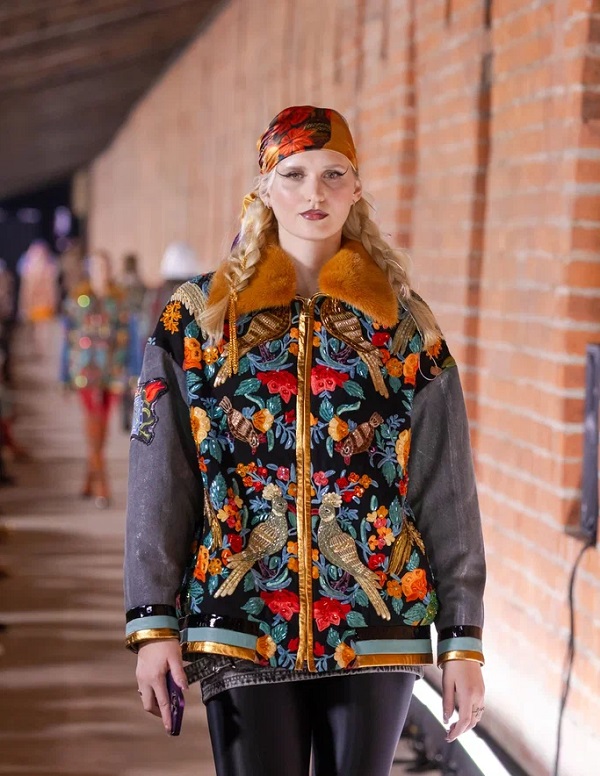
At the heart of the week was a profound appreciation for Russian heritage. This was most evident in the "Cultural Code" showcase, a special presentation by Wildberries that brought together six designers. This segment served as a microcosm of a larger trend, with designers transforming classic regional costumes into contemporary, wearable art.
The source of inspiration
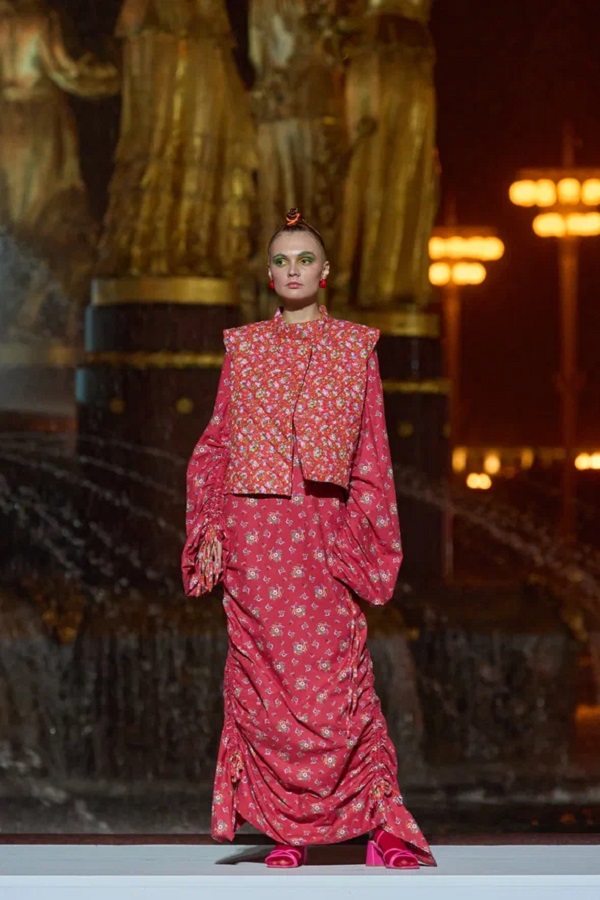
Designer Masha Andrianova's collection, "Istok" ("The Source"), offered a deeply personal interpretation of this theme. Inspired by her great-grandmother's writings, Andrianova created a line of flowing maxi dresses and tiered pinafores. The subtle layering and pared-back tailoring evoked a sense of intimate nostalgia, proving that the most profound designs often stem from personal history. Folklore and fairytales PiC-3 Victoria Tsiganova took a more direct, fairytale approach, specializing in the "à la russe" aesthetic. Her collection featured coats and denim jackets adorned with traditional motifs and Khokhloma-style painting. Topping off the looks with elaborate fur hats, Tsiganova transported the audience into a vivid, storied world of Russian folklore.
Legacy in every stitch
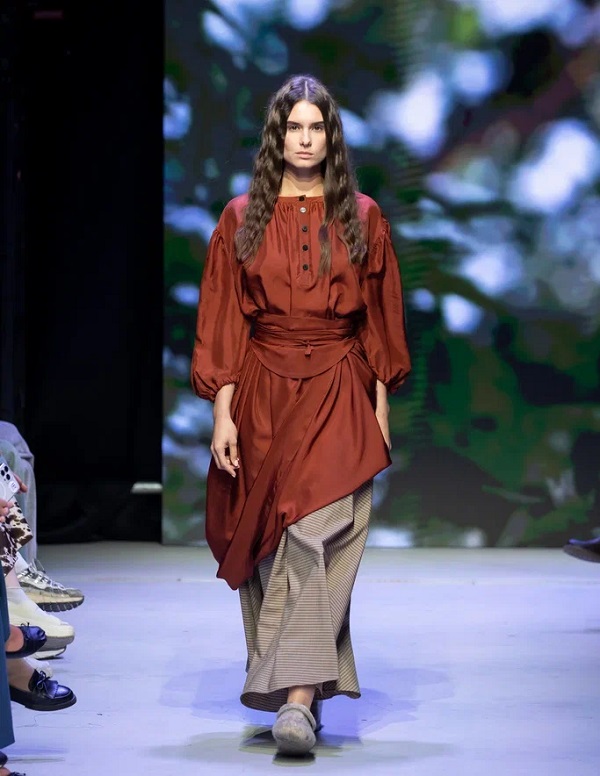
Collaborations between designers and historic textile mills highlighted the enduring legacy of Russian craftsmanship. The collection "The Shuya Bird" from Novikova DSGN and Shuya Textiles incorporated traditional patterns, including a recreated Baranov chintz. Similarly, Shuyskie Sitsy, a brand dedicated to reviving 19th-century prints, presented authentic sarafans and modernized folk attire, demonstrating how historical techniques can breathe new life into contemporary fashion.
A forward-looking heritage
This focus on heritage was not a nostalgic look backward but a vibrant, forward-looking movement. By reinterpreting their cultural codes, these designers affirmed that the deepest well of inspiration can often be found in the stories and traditions of home, ensuring Russian heritage continues to evolve on the global stage.

The 57th edition of Texworld Apparel Sourcing Paris successfully reinforced its status as the premier platform for the global textile and apparel industry.
Held from September 15-17, 2025, at the Parc des Expositions Paris-Le Bourget, the trade show brought together over 7,000 buyers and 1,300 manufacturers from more than 35 countries over three days. Organized by Messe Frankfurt, the event underscored Paris's central role in the international sourcing landscape.
The show was attended by visitors from the top five visiting markets concentrated in Europe: France, the United Kingdom, Italy, Spain, the Netherlands, and Germany. It registered a notable 25 per cent increase in attendance compared to the July 2024 edition, confirming the success of the strategic move to a September date.
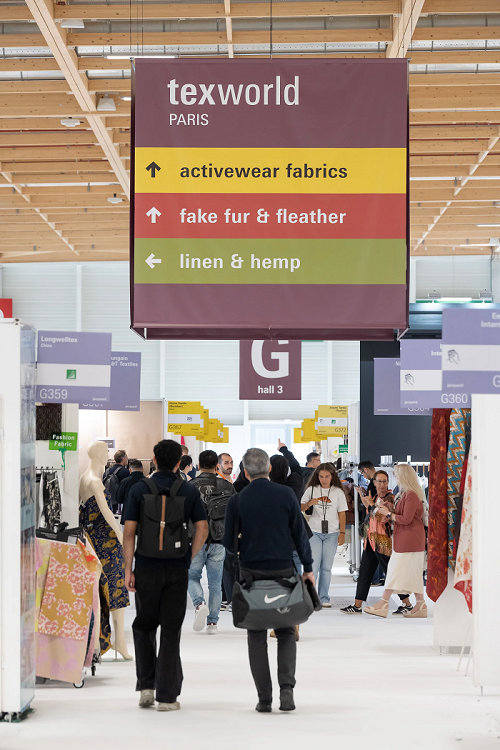
Enhanced experience and balanced offerings
The exhibition hall featured a new layout with two halls dedicated to product offerings and a third hall focused on services. The integration of relaxation areas, networking zones, and improved staging for trend forums successfully encouraged natural breaks and fostered better engagement.
For the first time ever, the show achieved a near-perfect balance in exhibitor numbers between textile offerings (Texworld Paris) and finished garments and fashion accessories (Apparel Sourcing Paris). Julien Schmoll, Marketing and Communication Director, Messe Frankfurt France, opines, this evolution directly reflects buyer response to current brand constraints.
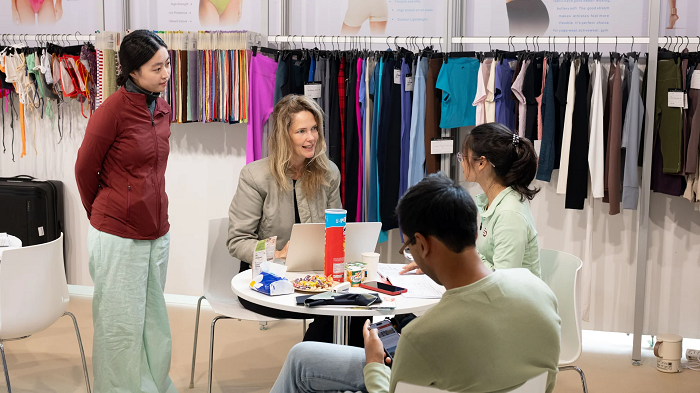
Expanding global reach and near-sourcing focus
With 1,300 companies from 35 countries and including the innovative Avantex sector, Texworld Apparel Sourcing Paris stands as Europe's leading sourcing platform. The show was attended by several major international players actively looking to strengthen their presence in Europe, viewing it as a more stable market.
These included newcomers like the Hong Kong-based Wing Ka Shing, which specializes in manufacturing knitted sweaters from its factory in DongGuan, China. The company attended the fair specifically to expand into the European market and mitigate the impact of tariffs imposed on products entering the United States.
The edition also focused on near-sourcing, with notable participation from Central and Eastern Europe (Armenia, Kyrgyzstan) and Southern Europe. It hosted the Near Sourcing Hub alongwith partner FourSource, The Hub featured eight companies physically present, alongside 28 others connected via FourSource’s B2B digital platform.
Innovation, sustainability, and the future of fashion The Avantex Paris sector served as a dedicated laboratory
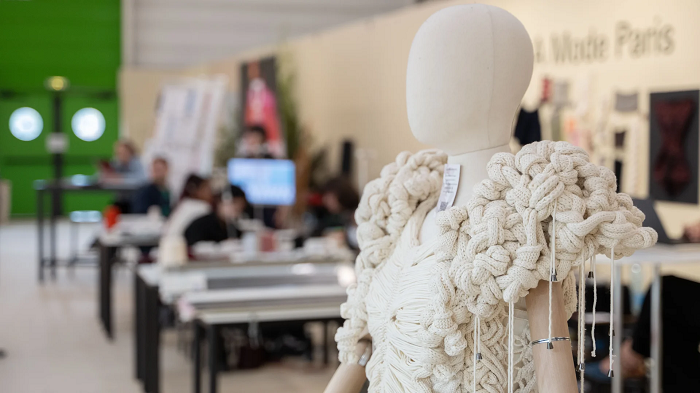
for innovation in sustainable fashion. It featured around thirty players across the HUB (solutions and services), the Designer HUB (design studios), and ReSources, which showcased companies selected by partner TCBL (Textile Clothing Business Labs).
The sector’s Agora hosted a packed program of conferences on key themes, including AI prospects, circularity, natural materials, and new consumption models. A highlight was the Bio Fashion Innovation Day, which showcased advanced projects in bio-based materials and eco-design.
The Avantex Fashion Pitch 2025 jury awarded the top prize to GoldenEye Smart Vision for its AI-based textile quality control system, which detects defects, optimizes production, and reduces waste. An Indian micro-enterprise and a collector and recycler of local waste, Green Worms, bagged a special prize.
Other show highlights included the Initiatives area, which showcased exceptional craftsmanship through live demonstrations by Pasari Textiles (Indian embroidery) and LISAA Mode students (knitwear). The Turkish industry’s creativity was also on display, while the China Textile Innovation Centre (CTIC) featured designs from selected Chinese manufacturers.
For the first time, the show experimented with new retail trends through live shopping sessions organized by the TikTok Shop teams. The event provided exhibitors a chance to test this new distribution channel, which TikTok launched for its 21 million French users in March.
Organized from September 2-4, 2025, the Intertextile Shanghai Apparel Fabrics – Autumn Edition reaffirmed its status as an indispensable platform for major industry players.

Held at the National Exhibition and Convention Center in Shanghai, the flagship fair welcomed over 100,000 visitors from 123 countries and regions, who networked with over 3,700 exhibitors from 26 countries and regions.
With China serving as the world’s largest manufacturing base, leading exporter, and second-largest consumer market, the event offered critical opportunities to gather market insights, discuss business, and explore the latest products and services across four main themes: fashion, functionality, sustainability, and innovation and digital transformation.
The show was held across nine halls spanning 240,000 sq m. Addressing the consumer demand for affordable, everyday clothing, the Essential Suits & Shirts zone made its debut. The exhibition also featured dedicated country and region pavilions from Hong Kong, India, Italy (Milano Unica), Japan, Korea, Pakistan, Taiwan, and the first-ever Türkiye Pavilion. Sustainability takes center stage

Econogy Hub
The Econogy Hub saw a 60 per cent increase in scale compared to the previous autumn edition. Its strong focus on sustainability, complemented by an open booth design, seminars, and display areas, served as a clear sourcing guide for eco-friendly materials.
A first-time exhibitor, Peelsphere showcased fabrics and bio-leather made from fruit waste and algae. Youyang Song, CEO, Peelsphere, noted, the Hub strongly aligns with our positioning and has connected us with our target customers. This fair has provided us with deep insights and strengthened our resolve to drive high-quality development.” Other new exhibitors with sustainable solutions included Chloris Biochem with sustainable dye solutions.

Focus on functional and digital innovation
The Functional Lab and the enhanced Innovation & Digital Solutions Zone highlighted new advancements shaping the future of textile production.
The Functional Lab featured new exhibitors including Cathay (HK) Biomaterial (bio-based fibers and polymers), Fibrant (nylon made from recycled waste like fishing nets and carpets), and Regina Miracle (high-tech lingerie, sportswear, and functional apparel).
In the Innovation & Digital Solutions Zone. exhibitors like AiDLab and Shima Seiki presented solutions such as AI-driven textile inspection technology and advanced design systems.
Highlighting the synergistic benefit of the zone, Prof Calvin Wong, CEO, Laboratory for Artificial Intelligence in Design (AiDLab), said, the number of visitors at this fair is much higher than before, and by placing our booth in the Innovation & Digital Solutions Zone, the synergy created with other technology companies brought us even more inquiries and opportunities for collaboration.

Fringe program and buyer sentiment
Featuring 37 seminars and nine themed forums, the fringe program offered critical industry insights. These events fused textile artistry with contemporary trends and unpacking the upcoming A/W 2026-27 vogues. Experts also discussed AI applications, smart manufacturing, and the role of advanced materials in functional textile production. Along with other displays like Bespoke Performance and The CUBE, the Intertextile Directions Trend Forum showcased over 900 on-trend and premium samples.
Buyer feedback emphasized the show's value as a consolidated platform for both sourcing and networking. Becky Godfrey-Faussett, Director, Snuggy Hoods, UK, stated, A key takeaway is the industry’s clear shift toward sustainability. It’s now a central theme across exhibitors, and aligning with eco-conscious partners is a growing priority for us. She also praised the fair for making it efficient to compare options and gather high-quality samples in one trip.
The rapidly growing UK online marketplace, OnBuy has opened its platform to retailers across 12 new markets. This move is a direct challenge to established e-commerce giants like Amazon and eBay, positioning OnBuy as a ‘retailer-first’ alternative across the continent.
The company has rolled out in countries including Germany, France, Spain, Italy, Netherlands, Belgium, Austria, Greece, Finland, Portugal, Ireland, Slovakia
The expansion strengthens OnBuy's status as one of Europe's fastest-scaling tech businesses. The company is already seeing huge demand, reporting that its European beta activity has delivered 308 per cent sales growth and over 40 per cent CAGR.
Building on this momentum, OnBuy forecasts an additional £100 million in Gross Merchandise Value (GMV) and at least 5 million new customers from its EU rollout over the next year. The company aims to increase its GMV to £1 billion within the next three years. It plans to go live in a total of 20 countries by 2025-end.
A cornerstone of OnBuy's strategy is its commitment to not compete with its sellers. Unlike marketplaces that also sell their own proprietary products, OnBuy acts purely as a platform, promising higher margins and transparent fees for merchants.
Cas Paton, CEO and Founder, OnBuy, emphasizes, retailers across Europe are calling out for a marketplace that truly supports them. Our model creates higher margins for retailers, more choice for customers, and a level playing field that the industry has been missing.
A key driver of OnBuy’s success is its industry-first, site-wide cashback program. It’s the only marketplace globally to offer customers instantly redeemable cashback on every purchase, which can be spent immediately on the site or withdrawn. This program has already delivered over 50 per cent repeat purchase rates in the UK, a crucial factor in driving sustained sales for its retailers.
To lead this monumental continental effort, OnBuy has appointed Marie Dauphin as Head- Sales. She is tasked with building localized teams and establishing partnerships across logistics and e-commerce platforms to onboard thousands of new European retailers.
The launch follows a landmark year for OnBuy, which included the earlier acquisition of the iconic British electronics retailer Comet, signaling the company's broader ambition to shake up the retail sector.
Recently renamed as Boohoo, the Debenhams Group plans to expand into the US market by striking deals to launching its British fashion brands on the online marketplaces of major American department stores including Macy’s, Bloomingdale’s, and Nordstrom.
The tie-up allows the Debenhams Group to list popular UK labels - including Coast, Warehouse, Oasis, Nasty Gal, and Karen Millen - on these US retailers' digital platforms. The Debenhams Group states, the three online marketplaces collectively attract over 350 million shoppers monthly, giving the British brands an unprecedented level of exposure.
Dan Finley, CEO, Debenhams Group, champions the move as a critical step in their global strategy. Through these partnerships, the Group’s labels will now be in front of millions of potential shoppers across the US giving British fashion an unprecedented platform in one of the world’s largest retail markets, he says.
The company has already reported encouraging early signs, noting immediate customer engagement across its brand portfolio on Bloomingdale’s and Nordstrom. Macy’s reportedly launched a dedicated marketing campaign for the introduction of Nasty Gal on its site.
The deals were facilitated by Refined Networks, an organization specializing in helping fashion and lifestyle brands scale internationally through online marketplaces.
This aggressive international expansion comes at a difficult time for the Debenhams Group, which is undergoing a major turnaround led by Finley amid mounting financial challenges.
During the year ending February 28, the company widened its pre-tax loss of £263.3 million (up from a £146.4 million loss the previous year), with revenues declining by 17 per cent to £1.22 billion.
To address these issues, the business has secured around £50 million in annual savings and cut its staff headcount by 30 per cent. In August, the company also announced plans to sell its popular PrettyLittleThing brand as part of the operational overhaul.
The Debenhams Group is also engaged in an increasingly public and bitter dispute with the Mike Ashley-owned shareholder Frasers Group, which holds a near-29 per ecnt stake. Frasers recently voted against a number of resolutions at the Debenhams annual general meeting, signaling its dissatisfaction with the company’s performance, which has seen its share value plummet by more than half over the past year.
United Kingdom’s premier fashion sourcing trade show, Source Fashion is launching a new retro-inspired brand identity ahead of its next edition, scheduled for January 12–14, 2026, at Olympia London.
The core of the rebrand is the 2026 creative theme, ‘Analogue Futures,’ developed in partnership with official fashion trend partner Trend Suite, founded by trend forecaster Tiffany Hill.
This theme is a manifesto, championing authenticity, slowness, community, and creativity as a counter-reaction to the increasingly automated and digital world. Aesthetically, the theme draws heavily on 1980s and 1990s nostalgia and aims to bring together global makers, designers, and retailers to explore fashion as a form of activism and expression through real human connection.
At a time when algorithms, polished pixels, and automation dominate, ‘Analogue Futures’ celebrates a growing creative movement that values imperfection, tactility, and genuine connection. The show reflects broader cultural trends - like the resurgence of film cameras, vinyl, and repair cafés - that are rejecting the ‘frictionless feed’ in favor of slower, more human ways of creating.
Suzanne Ellingham, Event Director, Source Fashion, says, Analogue Futures' is about valuing moments, memories, and creativity that lasts longer than a scroll. This really speaks to the mindset of slowing down, thinking about what we buy, how we make... It taps into degrowth models, reducing volumes, valuing what we make, and who makes it.
The new brand identity reinforces Source Fashion’s commitment to community, moving away from mass attention and quick transactions. Visitors to the January 2026 show can expect bold, retro aesthetics and analogue design cues woven into experiences across the floor.
Beyond the main exhibition, the 2026 edition will feature expanded community-building initiatives, including retail safaris, industry mixers, and collaborative content partnerships. By embracing imperfection and prioritizing people over technology, the "Analogue Futures" theme serves as a rallying call for the fashion industry to be more human, more sustainable, and more real.
A major global supplier of regenerated cellulosic fibers, Lenzing AG has unveiled a refined strategy to solidify its competitive edge amidst ongoing challenges in the textile and nonwovens markets and shifting geopolitical landscapes. The company aims to strengthen its agility, resilience, and cost structure, focusing on long-term value creation to maintain its position as a global leader in sustainable cellulosic fibers.
The strategy centers on three main pillars: prioritizing high-performance fibers, enhancing operational efficiency, and optimizing its asset footprint. Rohit Aggarwal, CEO, states, 2025 is a year of ‘continued execution,’ building on the company's ability to increase profitability even in a volatile environment.
Lenzing is strategically pivoting toward higher-margin, premium branded fibers like Tencel, Veocel, and Lenzing Ecovero, while gradually moving away from lower-margin commodity segments. This premiumization strategy includes a strategic review, potentially leading to the sale of its Indonesian production site.
Growth will target not only established areas like denim and home textiles but also expansion into high-value applications such as hygiene, packaging, filtration, medical, and industrial uses. To capture growing demand for renewable nonwoven fibers, the company will selectively shift production capacity from textile to nonwoven applications. Furthermore, Lenzing will intensify application-driven innovation through strategic customer partnerships and strengthening its application innovation centers.
To combat a weak market recovery, low generic fiber prices, and rising input costs, Lenzing is implementing aggressive efficiency measures. These measures include a significant reduction in its Lenzing-based headquarters headcount by approximately 300 employees by the end of 2025, primarily in overhead functions, aiming for over €25 million in annual savings from 2026.
Strengthening its presence in Asia and North America, will help reduce headcount by 300 by 2027 -end. Combined, these two measures are expected to deliver annual savings of more than €45 million.

The future of apparel manufacturing is here, and it’s smarter, faster, and more integrated than ever. This was the overwhelming takeaway from the recent China International Sewing Machinery & Accessories Show (CISMA), a massive showcase of innovation that highlighted the global industry's rapid shift from manual labor to automated, data-driven production. The exhibition, spanning over 40 acres, featured more than 1,600 exhibitors, almost exclusively from China, demonstrating a new era of "intelligent sewing."
The rise of the ‘Smart Factory’
At the heart of CISMA's new developments was the commoditization of complexity. Exhibitors unveiled a wide range of machines and integrated systems designed to perform multiple operations at a single workstation. This approach significantly reduces the need for human intervention, boosting productivity and cutting down on the number of operators required per garment. Technologies on display included:
● Template-based sewing: Machines pre-programmed to follow intricate patterns, combining multiple sewing steps into a single, seamless operation.
● Camera-based automatic sewing: Using visual AI to detect and guide fabric in real-time, ensuring millimeter-perfect precision and consistent quality.
● AI and robotics: Robotic arms and AI-powered systems handled everything from fabric cutting and material handling to sorting and final assembly, creating a highly efficient, automated workflow.
● Single-layer cutting: Advanced cutting tables, utilizing visual AI, now perform single-layer cuts with extreme accuracy, minimizing waste and enabling on-demand, customized production.
● Automated embroidery: Machines capable of replicating the intricate work of hand embroidery with digital precision. Some of these machines even use thread printing technology, eliminating the need for constant thread changes by printing colors directly onto a single base thread.
Data, efficiency, and the new reality
A key theme at CISMA was the power of data. The exhibition floor was a testament to the Internet of Things (IoT) in manufacturing, with machines, workstations, and entire production lines linked by a network of sensors and software. Factory-wide dashboards provided live, accurate data on every operation, allowing managers to monitor productivity, track material flow, and identify bottlenecks in real-time. This level of oversight and control is critical for optimizing production and responding quickly to changing demands.
The impact of these technological leaps is profound. Experts at the exhibition estimated a 40% reduction in the Standard Allowed Minutes (SAM) per garment, a critical metric for production efficiency. This is coupled with a dramatic 60-70% drop in automation costs, making advanced technology more accessible than ever before. For an industry that has long relied on low-cost labor, this presents a paradigm shift. With AI-driven machines now capable of stitching a T-shirt from start to finish with a single operator, the cost of production in highly automated factories is becoming competitive with, and in some cases even cheaper than, production in countries with traditionally low wages.
The Global Implications: Cheap labor is a liability
The developments at CISMA highlight a stark reality for the apparel industry worldwide: cheap labor is no longer an asset but a liability. The technologies showcased—which have been in development for years—have now been perfected and scaled to a point where they are becoming the industry standard. As automation and AI make labor less of a factor in production costs, countries and companies that fail to adopt these advancements will struggle to compete on productivity, efficiency, and quality.
The exhibition served as a wake-up call, demonstrating that the question for the modern apparel industry is no longer "Can we afford to automate?" but rather, "Can we afford not to?" The industry's future is defined not by the number of hands on the factory floor, but by the intelligence and interconnectedness of the machines they operate.
A global textile leader with a 220-year history, WestPoint Home officially launched the Phase 1 of its towel production line at its advanced manufacturing complex in the Kingdom of Bahrain. This expansion strengthens the company’s economic footprint and makes the facility the Middle East's only single-site manufacturer of both high-quality linens and towels.
The new line represents an additional $5 million investment into WestPoint Home’s Bahrain operations. Since establishing its presence in the country in 2006, the company has invested over $165 million, underscoring its commitment to manufacturing excellence and promoting tAbdulla bin Adel Fakhro, he ‘Made in Bahrain’ brand internationally.
The inauguration ceremony was attended by dignitaries including Abdulla bin Adel Fakhro, Minister of Industry and Commerce and Noor bint Ali Alkhulaif, Minister of Sustainable Development. Elizabeth Litchfield, Chargé d'Affaires, US Embassy in Manama, noted, US investment from WestPoint Home has supported innovation and benefited the US-Bahrain manufacturing sector for nearly two decades.
The new production line adds the capacity to manufacture premium towels, bathrobes, and bathmats alongside the company’s existing premium bedding and home textiles. Built with sustainability in mind, the facility is designed for reduced environmental impact. Phase 1 is expected to produce 4 million towels annually.
From its vertically integrated Bahrain complex - which handles everything from spinning and weaving to finishing and stitching - WestPoint Home supplies major global markets, including the US, UK, Europe, and the GCC. The company has already exported over $1 billion in products to the United States alone and produces textiles for leading customers like Ralph Lauren, Marriott, and Amazon.
The expansion also deepens WestPoint Home's contribution to local employment. The company currently employs about 1,300 people in Bahrain, including nearly 101 Bahraini nationals in key corporate and technical roles, reinforcing its standing as a major local employer.
Terming the launch as a ‘proud milesone,’ Jonathan Storie, President and CEO, WestPoint Home, says, the expansion is facilitated by Bahrain’s business-friendly environment, modern infrastructure, and supportive government partnerships. The investment advances their global customer service capabilities while creating new opportunities for their local workforce, he adds.
Looking ahead, the company also plans to launch the Phase 2 of the towel production line, Subject to the conclusion of negotiations for a GCC–UK Free Trade Agreement (FTA), the project allow WestPoint Home to significantly expand its exports and sales into the UK market.








